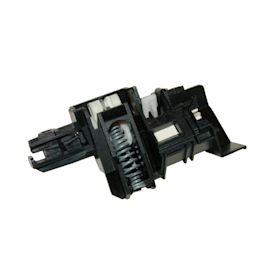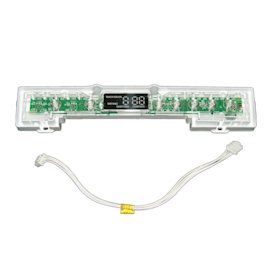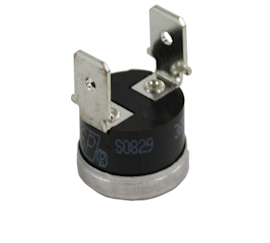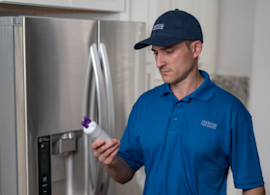Dishwasher not filling video


This Sears PartsDirect video shows how to troubleshoot a dishwasher that won't fill with water. The problem could be as simple as something stuck in the overfill float or a problem with the water supply line. Or one of several parts might have failed. Learn how to test the door switch, overfill float switch and water inlet valve to see which part to replace to get your dishwasher working again.
For additional dishwasher troubleshooting advice, step-by-step repair guides and error code charts, check out our Dishwasher DIY Repair page.
Tools and parts used
Torx screwdriver
Multimeter
Phillips screwdriver
Nut driver set
Mirror
Work gloves
Water container
Towel
Make sure water is on and check overfill float
Hi, Wayne here from Sears PartsDirect. Today we're going to talk about troubleshooting a dishwasher that won't fill. Let's start with the basics. Close the dishwasher door fully so it latches; otherwise it can’t fill. Next, check if the dishwasher water supply valve is turned on. You'll likely find this valve under the sink or in the basement under your dishwasher. You might be surprised at how many people shut this valve off when they go on vacation and forget to turn it back on.
Here's another basic troubleshooting tip. Something stuck in the overfill float, also called the mushroom float, prevents the dishwasher from filling. Open the door and pull out the bottom dishrack to access the overfill float. If you find a chicken bone or plastic cover, remove it.
Check for clog in water inlet valve screen
If these basic troubleshooting tips didn't resolve your fill problem, check the water supply going to your dishwasher. Here’s how: Shut off the water supply valve and disconnect electrical power by unplugging the dishwasher or shutting off the house circuit breaker for the dishwasher. To access the water supply, remove the mounting screws and pull off the bottom front access panel and toe panel.
On this dishwasher model, we'll remove the outer door panel and control panel to give us more room to work. With the dishwasher door open, remove the Torx screws from the inner door panel. Support the outer door panel with one hand as you remove the final screws so it doesn't fall. Separate the outer door panel and the control panel slightly from the inner door panel, and rest the outer door panel on the floor while you disconnect the user interface control wire harness. Pull off the outer door panel and control panel. Place a towel under the water valve to catch water and disconnect the water supply line from the valve.
Use a mirror to check for a clogged inlet screen. If you can't use a mirror to check the screen, remove the mounting screw and pull the valve off the bracket. Replace the water valve if you find the screen clogged. Debris from the clogged screen can get into the valve body, causing the valve to stick open and possibly flood your kitchen. Here's a video that shows you how to replace the valve.
Check water supply
Next we'll check for water flow through the supply line. Place the end of the water supply line in a container and briefly open the valve to check water flow through the supply line. If the water doesn't flow, have a plumber fix the water supply to your dishwasher.
Now we're going to check some electrical parts. Here's a diagram of the fill circuit in this dishwasher. Before the electronic control board sends current through the fill circuit, it checks the door switch to make sure the dishwasher door is closed. If the door is closed, the control board sends current through the overfill float switch to the fill valve. The dishwasher won't fill if any of these parts (or the associated wiring) break.
Test dishwasher door switch
We'll check the door switch first. Check the wire harness connection on the door switch. Reconnect the wire harness if you find it loose or disconnected, and repair any wires you find damaged. Here's a video that will show you more about repairing wires. To test the door switch, we'll check continuity through the switch using a multimeter.
Pull the door latch assembly off. Carefully trip the door switch catch by pressing this lever, keeping your fingers away from the spring and door catch. Hold down the switch lever and measure the resistance across the pins. A door switch that’s working properly measures continuity or near 0 ohms of resistance. Reset the door switch catch by pushing the door latch assembly into the door strike and then pulling it out. If you measure infinite resistance—that's a 1 in the far left corner on this meter—replace the door latch assembly. The control thinks the door is open when it's actually closed because the control doesn't detect any electrical current flowing through the door switch circuit. Here’s a video that shows you how to replace the door latch.
Check overfill float switch
Next, we'll check the overfill float switch at the bottom front of the tub. Open the float switch cover by releasing the locking tabs and lowering the cover. Examine the wire harness connection. Reconnect the wire harness if it's loose or disconnected. Repair the wire harness if you find damage.
Now we'll check for continuity through the float switch, because electrical current must flow through the float switch to reach the water inlet valve. Touch one meter probe to each of the float switch prongs. A working float switch will measure continuity. If you measure infinite resistance, replace the float switch because it isn't allowing electrical current to reach the water inlet valve. Here’s a video that will show you how.
Inspect and test water inlet valve
Next, we'll check the water inlet valve. Inspect the valve wire harness and reconnect it if it's loose or disconnected. Repair the wire harness if you find damage. Now we'll measure the valve resistance. Release the locking tab and disconnect the wire harness. Touch one meter probe to each of the valve prongs. You should measure around 1,400 ohms of resistance through the valve. If you measure infinite resistance, replace the water inlet valve because the electrical current won't flow through the valve.
Other electrical failures
If all of these components are okay, then a wiring break in a circuit elsewhere or a defective electronic control board could be preventing the dishwasher from filling. Have a Sears service technician diagnose and repair your dishwasher if you haven't found the cause of the fill problem by now. The service technician will conduct more advanced diagnostics to find out what's wrong.
I hope this video helps you out. You can find links to the parts we talked about in the video description. Watch some more of our troubleshooting videos on the Sears PartsDirect YouTube channel. Subscribe to get notified when we post new ones.
Most common symptoms to help you fix your dishwashers
Choose a symptom to see related dishwasher repairs.
Main causes: broken door spring, damaged or broken door hinge…
Main causes: damaged or stuck spray arm, leaking door seal, damaged door hinge, leaky heating element water seal, cracke…
Main causes: broken door latch, tripped circuit breaker, broken heating element, faulty vent fan, sensor failure, contro…
Main causes: improper loading, low water temperature, improper detergent dosage, detergent dispenser failure, spray arm …
Main causes: clogged kitchen sink drain, clogged drain hose, drain check valve damaged, drain pump failure, control syst…
Main cause: damaged rack height adjuster…
Main causes: glass or popcorn kernel stuck in the chopper blade, drain line vibrating against the cabinet, debris in was…
Main causes: not using rinse aid, rinse aid dispenser failure, broken heating element, malfunctioning vent, drying fan f…
Main causes: light switch beside the sink turned off, lack of power, bad dishwasher door switch, control system failure,…
Most common repair guides to help fix your dishwashers
These step-by-step repair guides will help you safely fix what’s broken on your dishwasher.

How to replace a dishwasher door latch assembly
If the dishwasher door doesn't click shut, a broken door latch is a likely cause. Follow these instructions to replace i…

How to replace a dishwasher user interface control
The user interface control houses the selection buttons and display. If it fails, you can't select the cycle and setting…

How to replace a dishwasher thermal fuse
A completely dead control panel often indicates that the thermal fuse on the electronic control board is blown; follow t…
Effective articles & videos to help repair your dishwashers
Use the advice and tips in these articles and videos to get the most out of your dishwasher.

Get tips on completing essential holiday cleaning tasks to brighten your home.…

Learn about all the convenient features on our Sears PartsDirect website that make your parts purchases easier.…

Get answers to frequently asked questions about Sears and Sears PartsDirect.…
